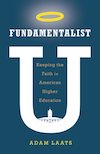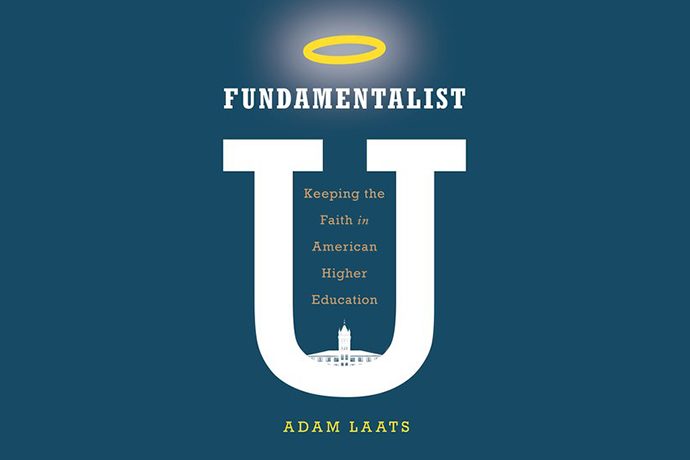Are they or aren’t they? As pundits have noticed, younger white evangelicals show signs that they are abandoning the political conservatism and GOP loyalty that defined their parents’ generation. Yet careful observers warn not to assume too much.

Fundamentalist U: Keeping the Faith in American Higher Education
Adam Laats
Oxford University Press
Mar 1, 2018
Yet the reasons for the alumni protest are just as shocking. The relationship between second-generation Liberty President Jerry Falwell Jr. and President Trump is beyond cozy. Trump gave his first Presidential commencement address at Liberty and nominated Falwell to head up a task force on higher education. Alumni felt obliged to voice their disgust at the close connection between their Christian school and Trump’s amoral sexual aggression and anti-immigrant ire.
Do these protests show a new evangelical outrage at jingoistic, sexist, racially coded appeals to right-wing politics? Or do most college-age white evangelicals—like most of Liberty’s students and alumni—join Falwell in embracing Trump?
The answer to both questions is yes. And, as I discovered during the research for my new book about the history of evangelical higher education, this paradox is nothing new. To the contrary, the struggle between Trump-style white nationalism and religiously inspired moral protest is not a twenty-first century exception, but rather a central, defining element of evangelicalism among white Americans. As institutions that rely on the good faith and trust of the evangelical community, evangelical colleges and universities have often been the stage on which this never-ending debate has played out.
In one sense, evangelicals have always been leaders in American higher education. Schools such as Harvard, Yale, and Princeton were established to teach new generations the truths of evangelical religion. In the 1920s, though, the idea of evangelical higher education changed dramatically. A new network of interdenominational conservative evangelical universities, institutes, seminaries, and colleges sprang up as part of a powerful protest movement. Calling themselves fundamentalists, these conservative evangelicals hoped to purify their churches and schools. Their universities promised to protect children from dangerous modern collegiate trends such as evolution, flappers, and booze.
Modern evangelical colleges have always struggled to define themselves in the face of Trump-style dog-whistle racial nationalism. On one hand, administrators consistently insisted that their schools represented safe institutional homes for the kind of white Christian nationalism that yearns to “make America great again.” On the other, they have also provided homes for thoughtful evangelical critics.
From the very start, modern conservative evangelical colleges promised to provide safe learning environments for evangelical youth. In the face of growing secularism and materialism in mainstream and liberal religious schools, evangelical colleges wanted to do something different; they hoped to shepherd students’ learning, to guide students thoughtfully and lovingly in evangelical directions. That promise has included more than just religious ideas. Throughout their history, evangelical school leaders have insisted that they would inculcate young people with patriotic, conservative political values as well.
At flagship Wheaton College in Illinois, for instance, school presidents insisted in the 1930s that their religious school taught children both “Americanism and Christianism.” They bragged that Wheaton taught students both “the Christian and American way of life.” Nearby at Chicago’s Moody Bible Institute, the president informed one donor in 1947 that MBI taught “the old-fashioned kind of Americanism.”
Perhaps most famously, the fundamentalist stalwart Bob Jones University clung to the notion that evangelical values were conservative patriotic values and vice versa. Second-generation leader Bob Jones Jr., for example, told audiences in the 1960s that his school taught students to “stand for the fundamental principles of Constitutional Americanism.” In every case, Jones Jr. insisted, “A good, Bible-believing Christian is by nature a good, patriotic American.”
This profound sense of defiant loyalty to old-fashioned Americanism helps explain white evangelical enthusiasm for Trump and it has always been embedded deep in the bones of evangelical colleges and universities. For those familiar with this history, recent moves against skeptical faculty members come as no surprise. In 2015, administrator Randy Beckum was chastised at Mid-America Nazarene University merely for reminding students that evangelicals must avoid subordinating their religious beliefs to their nationalist pride. More recently, Wheaton College pushed tenured Professor Larycia Hawkins—the first African American woman ever tenured at Wheaton—out the door for her publicized sympathy with Muslim women and her statements that Muslims, Jews, and Christians all worship the same God.
Such harsh penalties for such mild statements can seem outrageous. They might lead us to think that evangelical colleges and universities—even those that pride themselves on their academic excellence and theological profundity—are in thrall to a Trump-style jingoism, to a sense of usurped white privilege.
And in a sense, we’d be right. We need to remember, however, that those same universities have always also been the home of a powerful counter-tradition among American evangelicals. Just as their schools promised to push rigid patriotism, students and faculty members have always pushed back. Professor Hawkins, Vice President Beckum, and the Liberty protesters are only the latest examples of this long and powerful tradition.
At Chicago’s Moody Bible Institute, for example, student Ralph Parce tested the limits of his school’s commitment to anti-nationalist evangelical values back in 1934. The administration might have promised to teach “old-fashioned . . . Americanism” but Parce was a socialist. He insisted that his political beliefs did not hinder his dedication to evangelism and truly evangelical religious beliefs.
What was the school to do? A faculty committee hemmed and hawed. Some worried that a socialist student would horrify conservative supporters and undermine MBI spirit. Others insisted that no MBI student could ever be expelled due to mere political beliefs. In the end, by a narrow one-person majority, the faculty allowed Parce to remain.
The MBI faculty’s dedication to thoughtful evangelical critique of knee-jerk political conservatism was not unique. Decades later, Gordon College President James Forrester considered bringing a conservative “American Studies” program to Gordon’s campus. Promoters at evangelical institutions such as The King’s College and John Brown University wanted to encourage evangelical scholars to connect their religious conservatism to free-market political conservatism. When Forrester presented the idea to Gordon’s faculty, though, leaders balked. Faculty members disliked the “hard-right” implications of the programs. They insisted that their school could never simply preach conservative political ideas.
When today’s college-age white evangelicals move in progressive political directions, then, they are participating in a long tradition. As the history of their universities and colleges shows, thoughtful evangelicals have always questioned the connections between their conservative religious values and conservative political ones.
Those connections, though, have always been intensely powerful. It has never been easy for white American evangelicals to put their evangelical religion above their racial and national loyalties. At colleges and universities, particularly, explicit religious belief has often played second fiddle to a ferocious Trump-style white nationalism.


